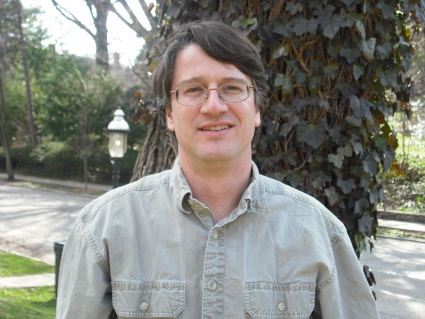
David Stradling is Professor of History at the University of Cincinnati. He teaches urban and environmental history and is the author of several books, including Smokestacks and Progressives: Environmentalists, Engineers and Air Quality in America, 1881-1951 (Johns Hopkins University Press, 1999), The Nature of New York: An Environmental History of the Empire State (Cornell University Press, 2010), and with Richard Stradling, Where the River Burned: Carl Stokes and the Struggle to Save Cleveland (Cornell University Press, 2015). He lives in Cincinnati with his wife and two daughters.
How the Cuyahoga River Fire Saved America and Other True-ish Stories
This talk discusses the myths surrounding the burning river and its role in shaping the environmental movement. Adding historical context to the fire, the talk describes the importance of Cleveland Mayor Carl Stokes and the relative powerlessness he experienced as he attempted to solve the problems of the combined urban and environmental crises.
The New Cuyahoga: Straightening Cleveland’s Crooked River
This talk describes the early 20th-century attempts to straighten the Cuyahoga in the city of Cleveland. Although these efforts ultimately failed, the battles surrounding the river tell us a great deal about Cleveland politics, the industrial economy, and American ideas about nature.
To Save Lake Erie: Engineers in the Age of Ecology
This talk describes the city of Cleveland’s late 1960s and early 1970s efforts to improve water quality in Lake Erie. Engineers proposed a variety of solutions, some of them remarkably fanciful, even as the persistence of combined sewers ensured lasting – and ongoing – pollution problems.
Earth Day and the Urban Environmental Crisis
In April 1970, Americans in cities and suburbs around the United States came together to discuss the environmental crisis enveloping their communities. The first Earth Day was a massive event, with teach-ins held on college campuses, at high schools, and in public spaces in every region of the country. Foremost, Americans expressed concern about pollution, especially urban smog and fouled waterways.
This talk will address how urban and suburban residents described the environmental crisis, worked to solve problems in their communities, and how they understood these problems as a part of the broader urban crisis.
TO SCHEDULE A PRESENTATION , PLEASE CONTACT:
David Stradling
stradlds@ucmail.uc.edu
Speaker Applications
If your organization would like to book a speaker, first contact the speaker to confirm program dates, times, and whether or not the program will be offered virtually.
After you have confirmed scheduling details, submit a speaker request form to Ohio Humanities at least six weeks before the presentation takes place. Upon approval, we’ll send you a program agreement packet and ask you to pay the appropriate application fee to Ohio Humanities. Groups are limited to three Speakers Bureau programs per year.
Speaker Fee Structure
Non-profit organizations with an annual budget under $150,000 pay a fee of $50.00.
Non-profit organizations with an annual budget over $150,000 pay a fee of $250.00.
Schools (including colleges or universities) and corporate or private entities pay a fee of $400.00.
For any questions, please contact Program Officer Melvin Barnes at mbarnes@ohiohumanities.org.
